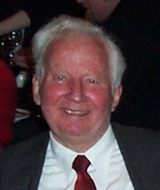John Goodlet Pryde, OBE 1925-2011
- Born 1925
- Kings High School, Dunedin,Otago University BA
- Victoria University of Wellington completed MA
- Reserve Bank 1948-1957
- Federated Farmers Economist, 1958-1963
- Chief Executive Federated Farmers 1964-1975
- Lincoln University 1979-89 including-
Director Kellogg Rural Leadership Programme
Director Agribusineess and Economics Research Unit - Economic Advisor to Joint Statutory Producer Boards 1991
- Economic Consultant 1992
- Nuffield Scholarship 1963
- President, NZ Association of Economists 1975-1977
- USA State Department Foreign Travel Grant 1978
- Life Member NZ Association of Economists 2004
- Fellow, NZ Institute of Management
 For much of half a century, John Pryde played a significant part in establishing the place of economics in New Zealand public life. He began by working from 1948 to 1957 in the Reserve Bank of New Zealand, as one of the economic research staff. His peers were, like John, an extra-ordinary group who later had distinguished life long careers in economics. Allan Catt writes of this time:
For much of half a century, John Pryde played a significant part in establishing the place of economics in New Zealand public life. He began by working from 1948 to 1957 in the Reserve Bank of New Zealand, as one of the economic research staff. His peers were, like John, an extra-ordinary group who later had distinguished life long careers in economics. Allan Catt writes of this time:
“As a group, we young economists were at odds with the conventional wisdom of the day that monetary policy was inherently ineffective as a macro-economic tool. We felt the problem was the Bank’s efforts being inadequate and John was courageous in expressing that view. It was a stimulating environment made the more on occasions by John’s ability to mimic and satirise those with whom we disagreed.”
At a time when official statistics in economics were not strong, John introduced New Zealand’s first retail trade survey. This was just one of several statistical initiatives taken then. Meanwhile John completed his MA in economics at Victoria University while working at the bank.
In 1957, John joined Federated Farmers, and was their Chief Executive from 1964 to 1975. He played a key part in the hearings of the Court of Arbitration, the National Development Conference and its’ later Targets Advisory Group, as well as in international trade negotiations, and in farming policy generally. When Britain did eventually join the European Community, John played an important role in the negotiations over New Zealand’s continued access to British markets. He was the Chief Executive of Federated Farmers over a period when farming fortunes and those of New Zealand were on the wane. That kept him intensely involved in ensuring that farming was well engaged whenever New Zealand’s future was the subject of discussion, and that New Zealand’s elected farming leaders were equipped for this.
In 1975, John and family moved south when he was appointed a senior fellow at Lincoln College, carrying out specialised research studies on farming issues. In 1978, the Lincoln College Council agreed to his proposal to run a leadership programme for future farm leaders. Lincoln had no money to deliver on this, and serendipitously John quite audaciously obtained the funding for the first five years of the programme from the US Kellogg Foundation. 1979 saw the first of the ten annual leadership programmes that he ran. Each programme had 25 students, producing a total of 250 leaders of farming in New Zealand. Graduates included one Prime Minister (Jenny Shipley) , and at least one cabinet minister. John’s dream and vision shaped the Kellogg Leadership programme, but it also required passion, determination and drive to not only put it in place, but sustain it.
When John retired from Lincoln in 1991, he remained active as Advisor to the Joint Statutory Producer Boards, and continued to pursue his quest for a better understanding of free trade among New Zealand’s leaders, and our key trading partners.
John Pryde was an inaugural member of the New Zealand Association of Economists, and served as President from 1975/1977. He strongly advocated for the promotion of women in the economists profession.
In all his roles, John has been strongly involved in matters of concern to New Zealand’s future. He has made a major contribution to the place of economics and economists in public life, carrying this on long after he formally retired. He was highly regarded and well liked, as described by Allan Catt:
‘John was a wonderful colleague, good company with a great sense of humour. He was the epitome of a compassionate, generous, well-informed and rational human being. As I write this I look back with a sense of personal loss that we didn’t see more of one another once we went our different ways.’
